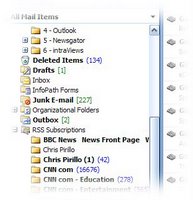Tuesday, January 24, 2006
IBM Instant Messenger Connects to the Outside
This is a major step not only because IBM is embracing the many free IM services out there, but also the recognition that IM is here to stay as not only a business tool, but a way for employees to easily IM people outside their workplace (via the free IM services).
Actually, IM is simply following the pattern set by email. If you recall, when email first started - before the advent of the Web it only worked within an organization. Remember, the internet is not the world wide web - the www was enabled only after Mark Andreessen invented the first Browser, called Mosaic, while in college in the early 1990's (and then went on to found Netscape). Today it's incomprehensible that one couldn't email to someone 'outside' their workplace. How far technology has come in 10 short years!
For the record, IBM claims 20 million users inside companies currently running Sametime, with 60 of the companies being in the 100 largest in the world.
Wednesday, January 18, 2006
AJAX Desktops - More than a Kitchen Cleaner
Imagine creating your own personal home page - full of new feeds and applications you want and use - in literally less than 30 seconds. And all without a lick of technical skill.
Or using a word processor or spreadsheet over the web, for free, with the same functionality as Microsoft Office. And then being able to share that word "document" via the web to collaborate with others, before publishing it to a shared site or blog. Sure beats emailing around a word document with the annotation feature turned on.
Next, imagine news and data literally streaming through your browser, updating in front of your eyes without the frustrating need for the webpage to refresh.
While AJAX is the term for a relatively new programming language (technically a combination of existing protocols), it's implications can be enjoyed by everyone who uses a web browser. In short, AJAX enables webpages to change instantly without having the whole page refresh.
This sounds like a small nuance, but in reality, it's enabling applications to be delivered literally as webpage in a way not possible before. Airline prices change instantly as you choose different routes, maps zoom in or out instantly. Changing text from bold to italic instantly. And that's just the beginning.
The two areas in which AJAX is making most inroads today is for personal home pages or start pages, and as a web-based alternative to Microsoft Word. Both of these items have sent a chill through the folks in Redmond (see what Bill Gates & Ray Ozzie told MS employees) - as they threaten Microsoft's grasp on basic Office apps, as well as outlook and the browser.
Why? Because today there are a small number of start up's offering Word-like functionality, over the web, for free (revenue comes from advertising, not software license sales).
Check out http://www.writely.com/ and you'll see what I mean.
I'm sure it's not long before Google buys them, and takes a run at Microsoft. Or MS buys them and moves Word into a free-for-use model.
Then there's the new phenomenon of personal start pages. There are probably more AJAX 'start page' products out there than RSS readers. And of course, all these AJAX start pages function as RSS readers.
I've been testing a few of them, including Google and Microsoft's "live.com," as well as a cool one called Netvibes.com. Others include:
Eskobo
Favoor
Goowy (Flash, not AJAX)
Pageflakes
Protopage
Zoozio
The differences appear minimal at this point (most of these have been in existence for only a few months), other than the integration with email.
Google seamlessly shows your gmail inbox, and Microsoft's live.com shows your MSN mail box. They all have ability to load basic content like stock tickers, weather, news and alike. At this point, though, I'm torn between using an AJAX start page, and a stand-alone RSS reader.
While the start page is great for viewing my gmail inbox, stock list, and RSS headlines, I'm finding I like my RSS reader (I use Newsgator) better for RSS feeds, as there is more content scanable without clicking - and simply have my gmail email sent to my outlook client.
Wednesday, January 11, 2006
Just when you've figured out which RSS reader you...
 Just when you've figured out which RSS reader you like the most, and set up feeds from the sites and blogs you like to read, comes news from Microsoft, via Outlook program manager Michael Affronti, that they're planning to include RSS reader functionality in the next version of Outlook (Outlook 12).
Just when you've figured out which RSS reader you like the most, and set up feeds from the sites and blogs you like to read, comes news from Microsoft, via Outlook program manager Michael Affronti, that they're planning to include RSS reader functionality in the next version of Outlook (Outlook 12).The practical implications of this for you and me is simple and direct - you'll get your RSS feeds as emails right in your Outlook - and file RSS feeds in folders, just like other emails. Interestingly, Yahoo! has already done this in Yahoo! Mail - that is, you can get RSS feeds right in your Yahoo!Mail inbox - and file them in folders, just like Outlook works.
While this technique is possible today in Outlook by using such third-party products from the NewsGators and Attensas of the world, users won't need them and will go directly with the built-in Microsoft option.
Robert Scoble, blogged about this in late December with a key point - users like to get their RSS feeds in many ways. Some like it in email, some in a web-based news reader, some in their blackberry, etc. And with podcasting on the rise, some like it on their iPods.
What's clear, however, is that being able to synchronize (e.g., only show RSS feeds you haven't read yet - regardless of where you first read it - in outlook, on a website, etc.) is a key feature that might give the current niche players a chance to survive the Microsoft onslaught. Of course, that's what people said about Netscape back when Microsoft first introduced Internet Explorer. Remember Netscape? Not many do.
